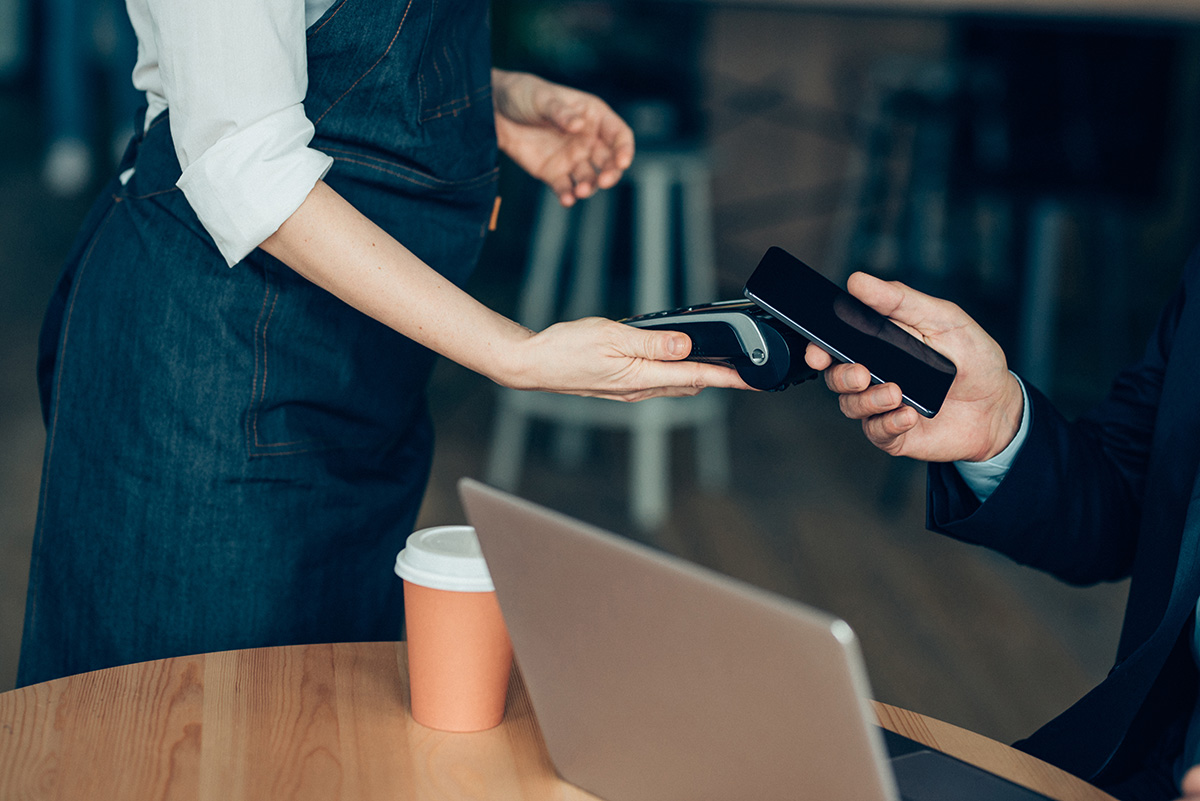
Payment Methods: An Overview of the Most Important Methods
The Most Important Payment Methods Summarized:
- In physical retail, four payment methods dominate: cash, debit cards, credit cards, and mobile payments.
- More than half of all transactions (51%) are still made in cash, although the use of cash is generally declining. Debit cards are now the most commonly used cashless payment method, followed by transfers and direct debits (20%) and credit cards (10%). ¹
- Online, credit cards, purchase on account, and e-wallets like PayPal are particularly popular.
- Purchase on account is considered the safest payment method for customers.
- Retailers should offer a wide range of payment methods depending on customer preferences, transaction costs, and the risk of payment defaults.
How can I pay anonymously today? There are various methods that are more or less suitable depending on the application and personal preference. The most common options are:
- Cash
- Prepaid cards
- Cryptocurrency
- Gift cards
Payment methods have changed significantly in recent years. In addition to the most commonly used payment methods – cash, debit and credit cards, and mobile payments – there are many other payment methods suitable for physical retail. The most common payment options in stores in Germany include:
- Cash
- Debit cards (often known as Girocard)
- Credit cards
- Mobile payments
- Prepaid and gift cards
Cash Payments
Despite the rise of digital payment options, cash remains a dominant payment method in Germany, especially in retail, although its share is steadily declining. According to the Deutsche Bundesbank, 58% of Germans regularly paid in cash in 2021. Cash is particularly preferred for smaller amounts up to 50 euros. A significant advantage of cash is its immediate availability and the absence of transaction fees for retailers. At the same time, the trend towards a cashless society means that more and more stores are accepting even small amounts via card payment.
Debit Card Payments
In Germany, the debit card, known as Girocard (formerly EC card), is the most commonly used cashless payment method. The most commonly used debit card is the Girocard, which is issued in connection with the German Giro account. With around 100 million cards issued, the Girocard is the most popular cashless payment method. It allows both contactless payments and transactions via magnetic stripe or chip. In 2023, around 42% of payments in German retail ² were made using Girocards. Companies need a card reader and must work with a payment service provider.
The most popular debit cards in Germany are:
- Girocard
- VPay
- Visa Debit
- Mastercard Debit
Credit Card Payments
Internationally, credit cards like Visa, Mastercard, and American Express are particularly popular for online purchases and use abroad, but they are also regularly used in physical retail. A credit card works by the credit card company initially covering the amount, and the cardholder repaying the sum at a later date, usually monthly. This delay can be advantageous for consumers but poses a risk of chargebacks for retailers. In 2023, the share of credit card payments in physical retail was 8.6%.
Common credit cards include:
- Mastercard
- VISA
- American Express
Payment Methods in Online Retail
Online, there are numerous payment options. For online shop operators, it is crucial to offer various methods to avoid purchase cancellations. If an online retailer offers only limited payment methods, customers who do not find their preferred payment method may abandon the purchase process.
The most popular online payment methods in Germany (2023) are:
- PayPal (27,7%)
- Purchase on account (26,7 %)
- Direct debit or bank transfer (16,7 %)
- Credit card (11,4 %)
- Transfer or prepayment (4,8 %)
- Installment purchase (3,9 %)
- Instant transfer (1,3%)
- Others (6,2 %)
Paypal und E-Wallets
An e-wallet, also known as a digital wallet, allows users to store their balance on a digital platform and conduct online transactions. Compared to credit or debit cards, the advantage is that bank details only need to be provided once during the e-wallet registration, not for each transaction or online shop. Additionally, the payment process is particularly convenient as only authentication via password, fingerprint, or facial recognition is required, without having to enter bank details each time.
There are many e-wallets, including:
- PayPal: The most widely used e-wallet in Germany and widely used in online shops worldwide.
- Google Pay: Allows the storage of credit or debit cards and offers the possibility to make payments both online and contactlessly on-site via smartphone. It can also be linked to PayPal.
- Apple Pay: Similar to Google Pay, it allows the storage of a card and easy payment online or on-site via iPhone or Apple Watch.
- Alipay: The most widely used payment service from China, with over a billion users.
- WeChat Pay: Another Chinese payment service considered the main competitor of Alipay.
PayPal is very widespread in Germany and is particularly popular with online shoppers. According to a survey, 46% of German online shoppers prefer to use PayPal for online orders. ³ Other e-wallets such as Apple Pay and Google Pay are also gaining in importance.
Payment by direct debit
Direct debit is another popular payment method in Germany, which is mainly used for regular payments such as subscriptions or invoices. The customer authorizes the merchant to debit the amount due directly from their bank account. The advantage of direct debit is that it is very convenient, as the customer does not have to actively initiate the payment, but the merchant carries it out automatically. It is also often perceived as secure, as the consumer can reverse an unauthorized debit within a period of eight weeks.
In e-commerce, direct debit is preferred by many consumers due to its user-friendliness and fast processing. According to studies by EHI, the share of direct debit payments in German online retail will be around 17% in 2023. ⁴ Direct debit is a particularly widespread method for larger companies that need to collect recurring payments.
Online payment by credit card
Paying online with a credit card is a popular payment method as it offers a high degree of flexibility and speed for both merchants and customers. During the payment process, customers enter their credit card details - such as the card number, expiration date and security code - and the amount due is usually authorized and debited immediately. Modern security procedures such as 3D-Secure (e.g. Visa Secure or Mastercard Identity Check) increase protection against fraud.
Payment in advance
When paying in advance, customers transfer the amount due in advance before the goods or services are delivered. This payment method offers merchants a high level of security, as they receive the payment before the goods are dispatched and there is therefore no risk of non-payment. For the buyer, on the other hand, this method can be associated with certain uncertainties, as they have to trust that the merchant will actually deliver once payment has been received. Despite these uncertainties, payment in advance remains popular, especially with smaller online retailers or businesses that want to keep their costs down by avoiding expensive transaction fees associated with other payment methods.
Purchase in installments and “Buy Now, Pay Later”
Credit-financed payments such as purchase in installments or the “Buy Now, Pay Later” (BNPL) option are becoming increasingly popular. In e-commerce in particular, many retailers offer this option to increase sales. Providers such as Klarna or Ratepay are particularly active in Germany and enable consumers to pay for purchases in several installments. Although this increases flexibility for the buyer, it also carries the risk of debt, especially if several purchases are made at the same time.
Instant bank transfer
Instant bank transfers are widely used online payment methods that are processed directly via the user's bank account. These methods offer a fast and secure way to make payments online without having to set up additional accounts or cards.
With an instant bank transfer, buyers are redirected to the payment service provider's platform, where they log in with their online banking details and authorize the payment directly from their current account. The retailer immediately receives confirmation of the payment so that the order can be processed straight away. This method is particularly attractive as no registration with a third-party provider is required and it is supported by most German banks.
Payment by cash on delivery
Cash on delivery is a traditional payment method where the buyer only pays the invoice amount when the goods are delivered. The amount is paid directly to the parcel service or the delivery company. This payment method is mainly used by consumers who only want to pay the purchase amount after receiving the goods, which offers a certain degree of security. Especially in Germany, where trust in online retail is traditionally somewhat reserved, this method enjoys a certain popularity among security-conscious shoppers.
Prepaid and Gift Cards
Prepaid cards are a popular payment method in Germany as they allow users to load credit in advance and then spend it flexibly without having to provide bank or credit card details. This type of payment is often used for specific purposes, such as with mobile operators offering prepaid cards for call minutes and data volume, or with streaming services and online platforms. Prepaid cards offer more control over spending as only the loaded credit can be used, minimizing the risk of debt. They are also popular with security-conscious consumers due to their anonymous use.
Gift cards are another form of prepaid payment method, particularly widespread in the retail and e-commerce sectors. They offer a simple way to give a set amount of credit that the recipient can redeem at a specific store or online provider. Many large retailers and platforms like Amazon, MediaMarkt, or iTunes offer gift cards. These cards are flexible and provide a practical alternative to cash gifts while ensuring that the credit is used only for the intended purpose. Gift cards are particularly popular during the Christmas season and for special occasions.
Cryptocurrencies
Cryptocurrencies are digital or virtual currencies that use cryptographic techniques to secure transactions and control the creation of new units. Unlike traditional currencies, they are not issued or controlled by a central bank but are based on decentralized technologies like blockchain. This technology allows transactions to be processed transparently, immutably, and without intermediaries.
In Germany, cryptocurrencies, especially Bitcoin, have gained increasing importance. Ethereum, Ripple, and other altcoins (alternative coins) are also widely used. Cryptocurrencies are mainly used in the context of investments and speculation, but they are also slowly gaining acceptance as a payment method. Some companies already offer the possibility to pay for products and services with cryptocurrencies, especially in e-commerce. However, the acceptance of cryptocurrencies as a payment method in Germany is still low. According to a 2022 Statista study, only about 2% of Germans regularly paid with cryptocurrencies. The main reason for this is the high volatility of exchange rates, which makes cryptocurrencies more of a speculative investment product than a stable means of payment.
For sellers, security and payment guarantees are crucial. The biggest risk is payment default – that is, customers not paying for a delivered product or service. But the refund or chargeback of payments on the customer side can also have unpleasant consequences for online shops. Here are the three safest payment methods:
- Prepayment: With prepayment, the seller receives the money before the goods are shipped, eliminating any risk of payment defaults. It is the safest method for sellers but requires a lot of trust on the customer side.
- Instant transfer: With instant transfer, the seller receives immediate payment confirmation, and the money is immediately debited from the buyer's account. This method offers high security as no chargebacks are possible.
- PayPal: PayPal offers sellers protection against payment defaults through their seller protection. The money is quickly transferred, and the customers' payment data is secure, increasing trust and security for both sides.
Credit and debit cards are also generally safe payment methods for sellers. However, customers can charge back the payment via chargeback. Some payment services, such as PayPal and "Buy Now, Pay Later" providers like Ratepay or Klarna, offer sellers a payment guarantee, which also ensures security.
When shopping online and in physical retail, it is important for customers to choose a secure payment method to avoid fraud and misuse. The biggest risk for consumers is not receiving what they paid for. Another risk is the misuse of bank data. Therefore, the safest payment methods are:
- Purchase on account: Purchase on account is considered particularly safe as the buyer pays only after receiving and inspecting the goods. No sensitive bank data is shared in advance, minimizing the risk of misuse.
- PayPal: PayPal offers a high level of security through its encryption technologies and integrated buyer protection. If a problem occurs, such as non-delivery or incorrect goods, PayPal refunds the purchase amount.
The safest payment method for buyers is purchase on account. They pay only after receiving the product and do not have to give their bank data to third parties. Similarly, payment on delivery is also safe.
Choosing the right payment methods for your business depends on various factors. It is important to consider the needs of your customers and the requirements of your business. Here are some considerations to help you decide:
Know Your Customers´Needs
Different customer and age groups prefer different payment methods. Older customers, for example, often prefer to pay with cash or on account, while younger generations prefer mobile payment services or PayPal. The better you know your customers and target group, the more targeted you can align your payment options.
Online or Physical Retail
If you run an online shop, it is particularly important to offer common online payment methods such as credit card, PayPal, instant transfer, and purchase on account. In physical retail, debit cards (Girocard), mobile payments, and cash are of great importance. It is also worth supporting contactless payment methods as they are becoming increasingly popular.
Security and Trust
Secure payment methods strengthen customer trust. Purchase on account offers the greatest security for consumers as they pay only after receiving the goods. PayPal, instant transfer, and direct debit also offer high security standards and guarantee quick and easy transactions.
Transaction Costs
Another important factor is the transaction costs associated with the respective payment methods. Credit cards and PayPal often have higher fees than, for example, Girocard or direct debit. Consider which payment methods fit your pricing structure and how much you are willing to invest in the convenience and security of your customers.
Integration of Payment Service Providers
Payment service providers like Klarna or PayPal offer easy integration of various payment methods for online shops and ensure smooth processing. They also offer additional security features, such as buyer protection or chargeback management, reducing the risk for your business.
International Customers
If your business operates internationally, you should offer payment methods that are also accepted by international customers. Credit cards like Visa and Mastercard are widely used worldwide, while e-wallets like PayPal or AliPay are particularly popular with customers from China.
Ultimately, the best strategy is to offer a wide range of payment methods to appeal to as many customers as possible and avoid purchase cancellations. A mix of traditional methods like debit and credit cards and modern options like mobile payments or "Buy Now, Pay Later" can increase the success of your business.
Whether in physical retail or online shops, the selection of payment methods is a crucial factor for sales. The more options you offer, the more customers you will attract, and the lower the likelihood that they will abandon the purchase because their preferred payment method is missing. It is important to consider the preferences of your target group and integrate both traditional and modern payment methods.
Secure and convenient payment methods like purchase on account, PayPal, and instant transfer strengthen customer trust and lead to a higher conversion rate. Additionally, the transaction process should be smooth and secure for both you as a retailer and the customers. A well-thought-out mix of different payment methods not only ensures more satisfied customers but also long-term customer loyalty and ultimately increases your sales.
¹ https://www.bundesbank.de/resource/blob/934826/cf30c0491030c0c6eab3d341d1990e12/mL/zahlungsverhalten-in-deutschland-2023-data.pdf
² https://de.statista.com/statistik/daten/studie/702443/umfrage/verteilung-der-zahlungsarten-im-einzelhandel-in deutschland/
³ https://de.statista.com/statistik/daten/studie/319321/umfrage/beliebteste-methode-zur-zahlung-von-online-bestellungen-in deutschland/
⁴ https://de.statista.com/statistik/daten/studie/224827/umfrage/marktanteile-von-zahlungsverfahren-beim-online-handel/


